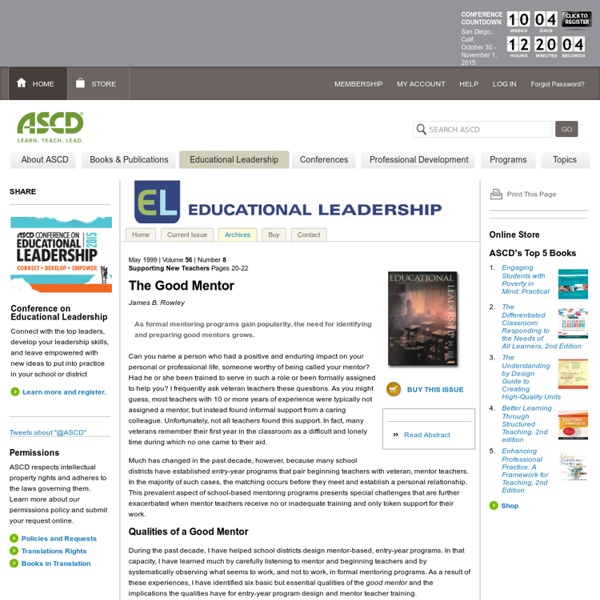Educational Leadership:Supporting New Teachers:The Good Mentor

Shifting pedagogies through distributed leadership: Mentoring Chilean early childhood educators in literacy teaching | Early Childhood Australia
Shifting pedagogies through distributed leadership: Mentoring Chilean early childhood educators in literacy teaching Michael Singh Jinghe Han Christine Woodrow University of Western Sydney THE POTENTIAL OF A sociocultural approach for empowering early childhood educators cannot be presumed, and its impact on leadership strategies and literacy teaching may be open to question. This paper reports on research into a professional learning program, the Programa Futuro Infantil Hoy, developed and implemented by a team of Australian early childhood academics in collaboration with Chilean early childhood educators. To contextualise and add meaning to this study in terms of the shifts from teacher-directed, instructional teaching to a child-centred, sociocultural approach, a brief partial account is provided of Chilean early childhood education.
Teacher Training: Staff Development Through Peer Mentoring
Mentor: In Greek mythology, a friend of Odysseus and a tutor of his son Telemachus; a name proverbial for a wise and faithful adviser. Included: A case study of a technology mentoring program that can work for all grades and all subject areas. As any staff developer or administrator knows, K-12 teachers can be a challenging group to train. On one hand, they're deeply committed to their students and to the learning environment. A mentor is simply a knowledgeable individual who can provide guidance, inspiration, and consolation to his or her colleagues. competent in the skills they will be expected to share. Mentors don't manage; they guide. Note: For ideas on conducting classroom observations, check out the Critical Friends Feedback Form. Mentoring isn't easy. So, how does peer mentoring work, and how can you or your staff developer design, implement, evaluate, and refine a peer-mentoring program? Such an abundance of technology also presents a challenge.
Early Childhood Teacher Mentoring
Page Content Support is available to early childhood teachers who mentor beginning teachers. Early Childhood Effective Mentoring Program 2016 The Effective Mentoring Program is a two day program offered to experienced and registered early childhood teachers planning to take on the role of mentor for a beginning early childhood teacher. It offers new mentors an introduction to effective mentoring practices and what it means to be a mentor, while also functioning as a 'refresher' for more experienced mentors and coaches. The program will also assist early childhood teachers to understand the requirements for provisionally registered early childhood teachers to achieve full registration. The program will be provided at no cost to participants. Further information, including the link to register for the program is at: The Victorian Institute of Teaching website. Dates More Information For more information on the program, please email Christina Costa at costa.christina.c@edumail.vic.gov.au
Victoria University - pilot professional mentoring program for early childhood teachers
Related:
Related:



